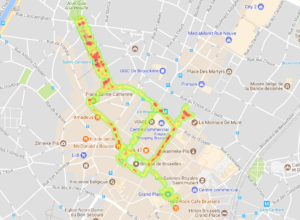Job description
There is a lot of interest in understanding and measuring the dynamics of crowds. A large number of applications can benefit from this information, such as the real-time management of people flow during large events, or the management of scenes of disaster.

Measuring crowd dynamics requires time-stamped localization data of the people. There are multiple ways to gather people localization data. Detecting WiFi-enabled devices (such as smartphones) using scanners is the method that stands out. This method is preferred because it is relatively cheap to deploy, nonintrusive, and requires little to no cooperation from the people that are being monitored.
Together with the organizer of the main events in Brussels, the Wireless Communications Group (WCG) at U.L.B. works on the monitoring of crowds with WiFi scanners to secure large events. A first prototype of the technology has been successfully demonstrated at ‘Plaisirs d’hiver’ organized in the center of Brussels in December 2016. The main street leading to the event has been equipped with WiFi scanners to count the number of attendees real-time. Even if the preliminary results are promising, the technology should be updated to cover the event globally and to further predict the crowd dynamics so as to prevent possible disasters.
We are seeking an outstanding and highly motivated post-doctoral researcher to join a research program aiming at developing an intelligent crowd monitoring system for large public events. The system will be able:
- To provide crowd density and directional fluxes maps in real-time.
- To anticipate and mitigate abnormal crowd behaviors, especially for safety issues, by learning crowd dynamics and proposing mitigation actions.
To reach these two objectives, dedicated crowd density sensors will be designed. In parallel, innovative crowd density forecasting algorithms will be developed, by using advanced Artificial Intelligence strategies.
The researcher will work in close collaboration with another post-doc specialized in electrical engineering, and with the support of one main mobile operator in Belgium. The system will be tested in real-life during large public events organized in Brussels. A pre-industrial prototype is foreseen by the end of 2019.
Profile
- An awarded Ph.D. in Artificial Intelligence (or PhD with strong experience in AI); An experience in forecasting algorithms is an asset;
- His/her ability to perform theoretical analysis, with a good publication track record;
- His/her strong willingness for field implementation;
- Excellent skills in spoken and written English.
Interested?
Applicants should submit via e-mail a curriculum vitae, the contact information for two references, and a copy of two to three representative publications from previous research to Professor Ph. De Doncker: pdedonck@ulb.ac.be.
Duration: 2 years full time in the first instance.
Starting date: presumably January/February 2018
Deadline for the submission of applications: Positions open until filled
